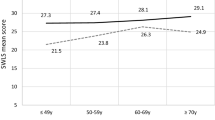Abstract
The extent to which a doctor or health professional can make a valid assessment of a patient's quality of life, anxiety and depression was investigated in a series of cancer patients. Doctors and patients filled out the same forms, viz. the Karnofsky, Spitzer, Linear Analogue Self Assessment Scales and a series of simple scales designed for this study, at the same time. Correlations between the two sets of scores were poor, suggesting that the doctors could not accurately determine what the patients felt. A further study examining the reproducibility of these scales demonstrated considerable variability in results between different doctors. It is concluded that if a reliable and consistent method of measuring quality of life in cancer patients is required, it must come from the patients themselves and not from their doctors and nurses.
Similar content being viewed by others
Author information
Authors and Affiliations
Rights and permissions
About this article
Cite this article
Slevin, M., Plant, H., Lynch, D. et al. Who should measure quality of life, the doctor or the patient?. Br J Cancer 57, 109–112 (1988). https://doi.org/10.1038/bjc.1988.20
Issue Date:
DOI: https://doi.org/10.1038/bjc.1988.20
- Springer Nature Limited
This article is cited by
-
Systematic methodological review of health state values in glaucoma cost-utility analyses
The European Journal of Health Economics (2024)
-
Associations between patient-reported late effects and systemic cytokines in long-term survivors of head and neck cancer treated with radiotherapy
Journal of Cancer Survivorship (2023)
-
Health-Related Quality of Life of Patients and Families with Primary Immunodeficiency in Malaysia: a Cross-Sectional Study
Journal of Clinical Immunology (2023)
-
Psychometrics of patient-reported bother from side effects of treatment single-items in industry-sponsored oncology trials
Quality of Life Research (2023)
-
Content validity and measurement properties of the Lower Extremity Functional Scale in patients with fractures of the lower extremities: a systematic review
Journal of Patient-Reported Outcomes (2022)



